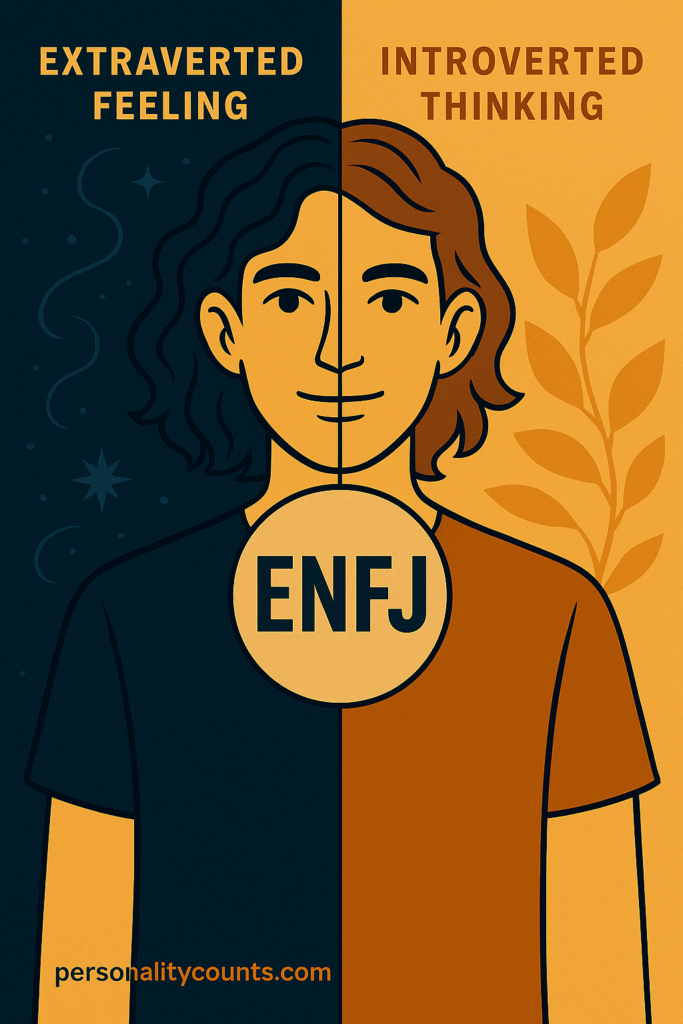
Understanding the Fe–Ti Polarity in ENFJs
ENFJs are charismatic leaders, empathetic friends, and natural motivators. At the core of their personality is Extraverted Feeling (Fe), which drives them to connect, inspire, and build harmony. Fe makes ENFJs attuned to group dynamics, social expectations, and the emotional currents in any room.
Balancing Fe is their inferior function, Introverted Thinking (Ti). While Fe focuses outward on people and relationships, Ti looks inward toward precision, logic, and internal consistency. For ENFJs, Ti often feels like a weak spot. They may struggle to slow down and analyze with pure objectivity, yet developing Ti is essential for balance—it helps them avoid overextending themselves for others without clarity or boundaries.
This Fe–Ti polarity defines much of the ENFJ experience: the push and pull between serving others and reflecting inward. When harmonized, it makes them not only inspiring but also deeply thoughtful leaders.
In Relationships
Fe makes ENFJs deeply attuned to the emotions and needs of their partners. They often anticipate feelings before they’re expressed, creating an environment of warmth and care.
Yet Ti’s absence can sometimes create blind spots. They may overcompensate for their partner’s emotions without logically analyzing whether their actions are sustainable or fair. By developing Ti, ENFJs learn to pause, check assumptions, and communicate more clearly rather than only reacting emotionally.
Example: An ENFJ may bend over backwards to fix a conflict (Fe) but only when they stop and analyze it (Ti) can they see the root cause and resolve it effectively.
In Careers
Professionally, ENFJs thrive in roles that involve motivating teams, mentoring, and communicating vision. They excel in teaching, leadership, counseling, HR, and creative industries. Fe gives them the ability to read people and rally energy around shared goals.
But Ti is what sharpens their effectiveness. When ENFJs integrate logical frameworks and analysis, they avoid becoming scattered or overly dependent on external approval. It helps them ground their leadership in facts as well as feelings.
Example: An ENFJ manager may boost morale (Fe), but Ti allows them to also analyze workflows, identify inefficiencies, and make reasoned improvements.
In Hobbies
ENFJs often pursue hobbies that connect them to others—group sports, volunteering, performing arts, or book clubs. These reflect Fe’s relational energy.
When Ti enters, they may also enjoy solitary hobbies that sharpen logic, like strategy games, puzzles, or journaling. These quieter pursuits balance their high-energy, people-centered lifestyles with moments of precision and reflection.
When Depressed
In depression, ENFJs may lose themselves in Fe overdrive—feeling disconnected when they can’t meet others’ expectations or blaming themselves for social disharmony. Their Ti may surface in a distorted way, leading them into harsh self-criticism or obsessive over-analysis of mistakes.
Awareness of the Fe–Ti polarity helps them recalibrate, remembering that self-worth doesn’t only come from others and that Ti can be used constructively rather than destructively.
When Stressed
Under stress, ENFJs often grip onto Ti in an unhealthy way. Instead of their usual warmth, they may become overly critical, nitpicky, or rigid in their reasoning. This feels uncharacteristic both to them and those around them, but it’s a natural response when their dominant Fe is overloaded.
Recognizing this grip reaction helps ENFJs pause and rebalance—returning to empathy while still respecting Ti’s role as a tool for clarity.
Handling Conflict
Fe pushes ENFJs to seek harmony in conflict, often making them mediators who smooth tensions. However, this can also lead them to sacrifice their own needs just to preserve peace.
Ti, when integrated, strengthens them in conflict. It allows them to argue fairly, present clear reasoning, and set boundaries while still valuing the relationship. With both Fe and Ti active, ENFJs can resolve conflict with both empathy and precision.
Blind Spot Challenge: Introverted Sensing (Si)
Beyond Fe and Ti, ENFJs often stumble with Introverted Sensing (Si), their blind spot. Si is about consistency, detail, and reference to the past. For ENFJs, this often feels unfamiliar or uncomfortable.
Signs of the Si blind spot include:
- Forgetting important details while focusing on the bigger emotional picture
- Struggling to maintain routines or follow long-term traditions
- Overlooking past lessons and repeating mistakes
- Feeling trapped when forced into repetitive, detail-heavy tasks
While ENFJs thrive in forward-looking, people-centered environments, strengthening Si provides grounding. Small routines, keeping track of details, and honoring past experiences help them avoid burnout. Developing Si doesn’t mean abandoning their inspiring Fe—it simply roots it in stability.
Real-Life and Fictional Examples
Real-life ENFJs are often motivational leaders or performers who inspire through connection. Those who integrate Ti and Si tend to be the most effective—they balance charisma with grounded decision-making.
Fictional examples include characters like Morpheus from The Matrix, who inspires with vision (Fe) but also demonstrates careful analysis when guiding Neo (Ti). Those moments of grounding reveal how balance enhances leadership.
Practical Ways for ENFJs to Balance Fe, Ti, and Si
- Pause before saying yes—analyze logically if commitments align with personal goals
- Use journaling or reflection to strengthen Ti clarity
- Set routines for rest and self-care to integrate Si
- Track important details with digital tools to avoid overwhelm
- Practice saying “no” in small ways to protect boundaries
FAQs
Q: What is the dominant function of ENFJs?
A: Extraverted Feeling (Fe), which makes them charismatic, people-focused, and relationship-oriented.
Q: Why do ENFJs struggle with Ti?
A: As their inferior function, Ti feels unnatural. Under stress, it can make them overly critical or self-doubting.
Q: What about Si in ENFJs?
A: Si is their blind spot. They may overlook details or struggle with routines, but developing small Si habits adds balance.
Q: Can ENFJs thrive in tech or AI roles?
A: Yes. ENFJs excel as leaders, communicators, and mediators in tech, helping teams stay human-centered. Integrating Ti helps them evaluate systems, while Si assists in managing detail-heavy projects.
Final Thoughts
The polarity between Extraverted Feeling and Introverted Thinking shapes the ENFJ journey. Fe fuels their charisma and compassion, while Ti provides balance through clarity and logic. By addressing their blind spot in Si, ENFJs become not only inspiring leaders but also grounded, detail-conscious visionaries.
When ENFJs integrate all sides of this polarity, they build harmony that is both heartfelt and sustainable.
